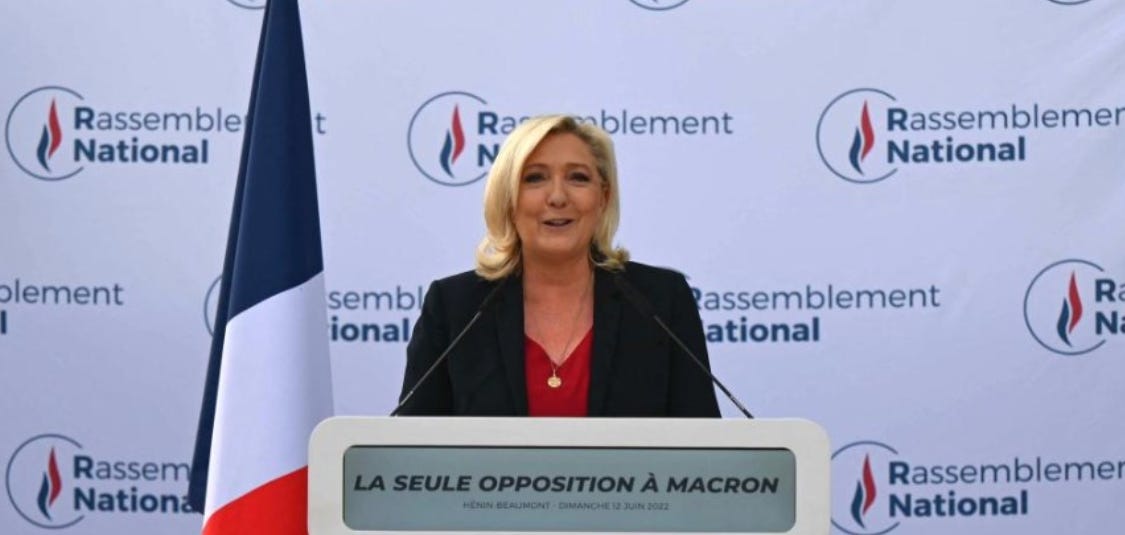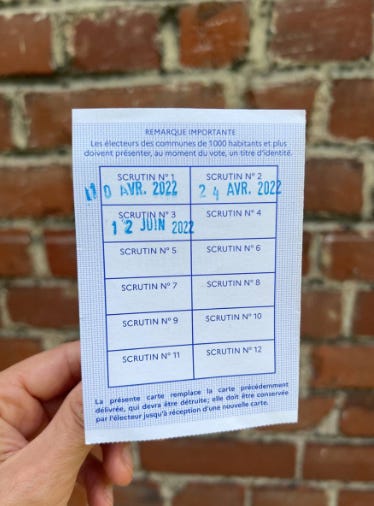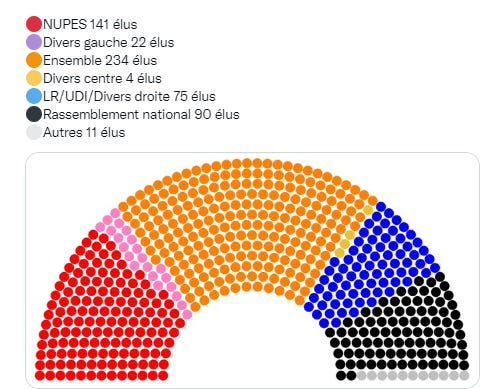La S.O.S. France, La Gifle, le pays est bloqué
(bilingual French and English about latest France Legislative Election)
En réalité ce soir nous assistons à une poussée de l'extrême droite en France. Le Marine’s RN (Rassemblement National) réalise une percée historique aux législatives, et une "situation inédite" qui "constitue un risque pour notre pays", estime Le Président Emmanuel Macron et Première Ministre Elisabeth Borne. La composition de l’Assemblée nationale supposerait une culture du dialogue et du compromis dont on est à l’évidence très loin en France, à en juger par la tonalité des débats.
Sur 97% des bulletins dépouillés, on est à 53,1% d'abstention et 7,7% de bulletins blancs nuls. C'est un peu moins qu'au second tour de 2017 sur les deux tableaux, mais ça n'en reste pas moins énorme.
Ce n'est pas la victoire franche pour la majorité présidentielle que nous espérions. J’entends les uns et les autres se complaire dans le rôle d’opposition. Comme si l’enjeu était de s’opposer, et non de gouverner. Nous verrons, dès les prochains jours, qui votera ou non les mesures que nous proposerons pour faire avancer la France. Emmanuel Macron n'a pas de légitimité pour imposer son projet, Marine Le Pen n'a pas de légitimité pour imposer son projet. Mais il faut le dire, nous n'avons pas non plus de majorité et de légitimité pour imposer notre projet. Curieusement, au sein des partis politiques, personne ce soir pour mettre en cause la légitimité des députés en affichant leurs scores en pourcentage des inscrits. N'oubliez pas Macron qui fait campagne dans rien dire de ses objectifs. Le marketing politique a ses limites.
En remportant moins d’une centaine de sièges à l’Assemblée, le Rassemblement national n'enregistre pas seulement son meilleur score dans sa propre histoire, il remporte aussi 52 millions d'euros de financement public. Le RN est endetté de plus de 20 millions d'euros. Détail financier pour le Rassemblement National 4,24 millions de voix au premier tour X 1,64 euro, 89 députés RN X 37,402 euros. Près de 52 millions de financement public sur le quinquennat.
À force d'avoir banalisé les idées d'extrême droite, la Macronie a propulsé le Rassemblement national après la percée spectaculaire du RN à l'Assemblée nationale, politiques de droite et de gauche tiennent Macron responsable. Désaveu pour Macron, vague (Rassemblement National) Marine’s RN et succès mitigé pour la Nupes: les leçons du second tour des législatives. Le Président a été réélu en mai, ce soir, nous sommes le 1er groupe à l’Assemblée. Mais nous n’avons pas la majorité absolue.
Le projet de Jean-Luc Mélenchon est un miroir aux alouettes qui conduirait notre pays à l’austérité. L’enjeu du 2nd tour Face à une campagne populiste et démagogique, face aux projets incohérents et infinançables des extrêmes, c’est de donner à Macron une 'Assemblée National pour agir vite et fort sur le pouvoir d'achat, sur la santé, sur l’école, sur la transition écologique et énergétique. l'idée selon laquelle une coalition de gauche et un parti raciste/anti démocratique seraient équivalents. Le résultat, c'est une banalisation sans précédent de l'extrême droite.
—-------
Today is a shocking defeat for Macron in the Parliament election, losing his parliament majority. Lean to the right and get Les Républicains (LR) to prop him up. This is “bad alarm” for another midterm election in November 2022 amid an economic crisis: in the U.S., Biden’s gamble. Macron lost in legislative election because the government failed to tackle economic impact in several months (not only) because of the Russia -Ukraine war but also unmitigated Coronavirus.
Marine Le Pen far right Rassemblement National (RN), 2 months ago lost in the Presidential Election, projected to win 85 seats & maybe as many as 100 - will be by far the biggest far right group in any French parliament since the second world war. For more context, in the Presidential Election, Macron won 7% more votes than he received in 2017. So this turnback really annoyed Macron.
Macron's centrist alliance Ensemble won only 224 seats, down from 350 in 2017. Mélenchon's left-wing alliance NUPES secured 149. Republicans save face with 78. Some key old-time Macron allies have lost their seats, including Richard Ferrand (the parliamentary speaker) in Brittany and Christophe Castaner (his former interior minister) in Provence.
To have such a massive number of Rassemblement National (RN) deputies in parliament represents the alarming normalization of far-right discourse in French public life. Macron now has no good or easy choices for his 2nd term. Either rule with a minority government, like Former President Rocard in 1988-1991, but with tighter rules on bypassing parliament. Or seek a coalition, forcing him to the right. Neither will make for stable or visible policymaking in France.
Most of the Macron party is centre-right and Mélenchon is too arrogant to deal with. In the poor Paris suburbs and region north of the city, Mélenchon won all 12 seats. Politics is still about class. Melenchon demands an in-depth debate on economic policies, his party says it works with dozens of economists. In passing, he slams Macron's team for what he describes as scaremongering about the left's program
United Left did well but much less well than hoped. Another side, Macron did bad and will have hard time creating coalitions because very dropped seats he win in legislative election. Les Républicains (LR) bounced back a bit. Big winner (again) is RN (rather than far right).
The latest numbers are showing Macron's coalition with about 220 seats, and the right-wing Les Républicains (LR) at about 60 seats. You need 289 seats for a majority. The arithmetic is challenging: 220 + 60 = 280. That's 9 seats short of a majority. According to the latest Ifop/Fiducial projection, Ensemble and LR/UDI have a majority even at their lower bound estimate.
But even amid a big loss, Macron still got something good. PM Elisabeth Borne re-elected. Another win, visible relief for Clement Beaune, Macron's EU affairs minister and key ally of the president. Clement was elected in his Paris constituency (although in a super tight race) and should therefore keep his minister job. A defeat (of Clement) would have been a blow for Macron’s EU agenda, and blessed, Clement wins.
So much for the debate about the proportional vote in France, the far right and far left didn't need it, they stormed parliament under the old rules. Also, when you break the results down to parties, instead of focusing on bulked-up coalitions, Le Pen's party came in second. The French political system is about to transition abruptly from a presidential regime to a parliamentary regime. The action will shift from the Élysée (president) and Matignon (prime minister) to parliament. Everything will be dealmaking in parliament.










